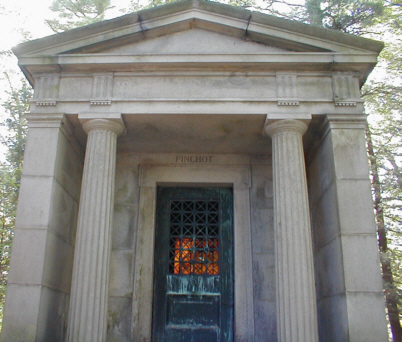Erik Visits an American Grave (VII)
This is the grave of Gifford Pinchot.
Like most Progressives, Gifford Pinchot’s legacy is deeply complicated. The nation’s first major forester, a process begun with his father felt terrible for all the damage he had caused to the American landscape, Pinchot fought to place some level of regulation over the nation’s forests. This was necessary because the modus operandi of the timber industry was to cut down every tree and move on, beleiving there was always another forest somewhere else and besides, the best way to use the land was to turn into farms anyway. This ideology became challenged with the disastrous experiment to farm the cut-over forests in the Great Lakes region. The Harrison administration placed the first extremely limited attempts to regulate forestry on the books, but it took until Theodore Roosevelt before some kind of larger attempt at forest regulation came to being. Roosevelt named Pinchot the Chief Forester of his newly created U.S. Forest Service in 1905, after Pinchot established the Society for American Foresters in 1900. He served in that position until getting into an argument with Taft’s Secretary of the Interior Richard Ballinger over the latter being a hack for the timber industry. When Taft fired Pinchot, it was the last straw between Roosevelt and Taft, leading to the 1912 Bull Moose run.
But Pinchot definitely did not believe in preserving forests for forests’ sake. Rather, he wanted their efficient use and replanting. After the 1906 San Francisco earthquake, Pinchot was a major supporter of the plan to dam the Hetch Hetchy Valley in Yosemite National Park to send water to that city. When John Muir and the Sierra Club challenged this, Pinchot and Roosevelt thought of Muir as a loon. Pinchot was all about the greatest good for the greatest number of people. So one assumes that he would be totally cool with us today flooding his graveyard and sending the water to New York City. Have to be consistent after all.
Pinchot, a prohibitionist, also has some responsibility for Pennsylvania’s ridiculous liquor laws. He was governor when Prohibition was repealed and so led his state to create restrictive laws such as the state-run liquor stores and Pennsylvania Liquor Control Board, both of which are still around today. Of course, he’s not responsible for those laws still being so restrictive, but still. He also supported big public power plans while governor, with his pre-TVA calls for major dam systems leading to accusations of socialism.
Gifford Pinchot is buried in Milford Cemetery, Milford, Pennsylvania.

